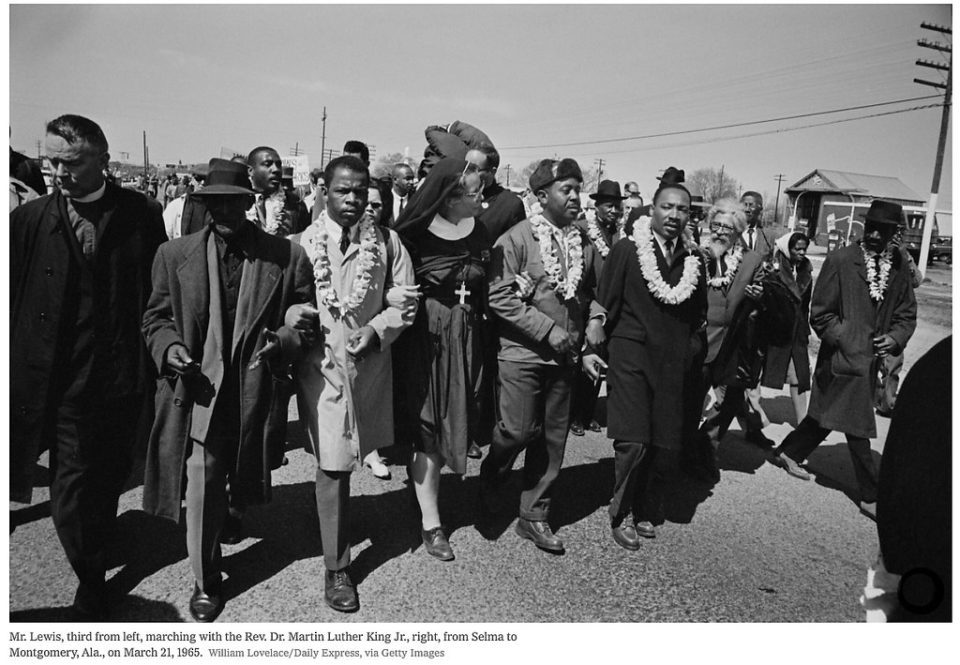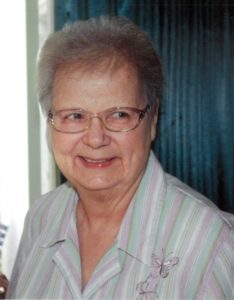
We invite you to listen to Sister Dolores recall her experience of the March 25, 1965, Civil Rights March to Montgomery, Alabama. She was one of the 25,000 non-violent demonstrators, marching with Dr. Martin Luther King, Jr. to petition Governor George Wallace to pass the ‘Voting Rights Act’.
That August, Congress passed the Voting Rights Act, guaranteeing the right to vote to all African Americans.
We thank Sister Dolores for sharing her account of the 1965 Freedom March. As we reflect on this moment in history let us contemplate: What have we learned? How are we doing? What’s next? Where might God be inviting each of us to speak up or act for justice?
Audio Transcipt
We had been listening to the news, as much as we did in those days after supper. I don’t even think we had transistor radios then. Anyway, when Monsignor came over to talk to us and told us he wanted two Sisters to volunteer to go to this March along with him and a contingent from Saint Louis. Sister Alphonse and myself raised our hand immediately. We had previously taught in Saint Mark's parish and loved the black community; it was just natural that we should volunteer to do this.
Sister Catherine Patricia made it clear to Alphonse and myself and Monsignor Durkin that she would have to get permission from Mother Kevin. She came back a little while later and said that Mother Kevin said yes, we could go, but that Sister Catherine Patricia would have to go with us which she gladly did, she just wanted to accompany us.
This march happened in a day we went to the airport early in the morning. A prominent St. Louis businessman who was also on the Human Rights Commission, Charlie Vatterott, had chartered plane. There we were packed with clergy and religious were going down to Montgomery. It was early in the morning, and we didn't go to the main airport. We went to someplace not too far from there, where we waited to get on to this plane. Whoever was the spokesperson looked out at all of us and said “before we take off let's think about why we're going down there. We're going to this march, it could be dangerous” and then he said, “You know somebody might be killed.” And he said, “think about that and if you want to get off the plane, now's the time.” Nobody got off the plane. We were all on our way to Alabama.
When we got there our plane was out in the field someplace so that we could join the march as marchers would go by and we would merge in. This was going on all around the line of the march. Religious and priests were all over the place in this march. When the march got to the place where we would join, we did merge in.
And as we marched through different towns in Alabama we sang over and over again ‘We Shall Overcome’, ‘Amazing Grace’, other songs similar to that just over and over and over. Some of the towns that we marched through were towns that you might see in a movie like, ‘To Kill a Mockingbird’, very, very poor, no grass growing, just dirt outside the house. The black men, women, and children were standing out there watching us march by. And they would say “God bless you for coming!” “Thank you for coming!” And they were so grateful to us. Sometimes somebody would come over to us and shake our hands for coming as we walked by.
Other towns that we marched through were mostly in white neighborhoods and we got different impressions there. One of the things that happened was most of the white people were just silently looking at us some were looking at us staring like, “Why did you come here?” Others were shouting out “You n lovers go home, go home!” And this went on as we walked towns like that.
Eventually as we continued the March, it was probably about halfway through, when one of the leaders said, “You know, we're going to stop now.” So we had packed a little lunch with us in our little brown sacks, no plastic water bottles. We didn't have anything to drink, but we had cut up orange slices before we went. So, we sat down in the middle of the street. Now that was OK for Alphonse (aka Dottie Hummert), and myself, but to see Catherine Brennan sit down there too! Now we're in black mantels, it is hot, and it is humid, and the sun is shining on us. So we're sitting there… our pastor Monsignor Durkin was a very meticulous person and we thought Oh my God is he going to do? Well, he sat down in the middle of the street like everybody else did and you could look back and see this whole ribbon of clergy and religious sitting there eating there our lunch.
After that we continued to the Capital. One of the signs that was on a billboard up above was a picture of Martin Luther King junior with a big slur on it. Another thing that happened was along the march was the state troopers were up on the rooftops, and that was something that the man had said, “You will see state troopers protecting you.” Looking up at the state troopers, they were standing there with rifles you know, protecting us, protecting the marchers all along the way, and I think I was more afraid of the state troopers than I was of anybody else. But on thinking back on it, I think the state troopers were probably just as afraid as we were that something would go wrong.
We eventually right at where we would be, not real close to the capital, but close enough. They had been megaphones to listen to the speeches. Doctor Martin Luther King led the speech that was addressing Governor Wallace and all the people that were gathered there. And there were other prominent black leaders at the capitol too. We could hear. even though we were at a distance, it was very moving. We were just glad to be able to say that we were here, we were with these people. Years later I would call it, we were the sacrament of Christ encountering all the people along the way.
After the march was over, after the speeches were over, this was so well organized, every contingent was directed to a particular place where we would be fed. Anyway, we ended up in in a Baptist church very prominent one on Dexter Street, I think it was where we were greeted with the black women and men and children who had prepared the meal for us. So, we sat down to delicious fried chicken, and we were hungry by this time. The day ended with that meal and us being bussed back to the chartered plane. So it was like, it wasn't even a 24 hour thing, it was a day thing and so much was packed into our memories, the feelings that we had, the emotions that we had,
I remember that in the parish Monsignor Durkin invited any parishioner who would want to come to a meeting that he would tell the people our experience of being there. A lot of people came to that, they preached at the Sunday liturgies. For myself and I think for Catherine Brennan and Dottie Hummert, our debriefing went on in telling our children in the classroom. I had 4th graders, Dottie had 3rd graders, whatever they could understand at that age. But also, in sharing with community members and our families, I think the debriefing went on for quite a period of time after that. I will say that most of the parishioners and most of our Sisters were really grateful that we had participated in this march and there were some that weren't so grateful. Some they still looked at it little strange in the parish and a little strange at community meetings, but for the most part we were very pleased with the response of our Sisters.
 We thank Sister Dolores Shortal for sharing her memories of this historic event with us.
We thank Sister Dolores Shortal for sharing her memories of this historic event with us.
